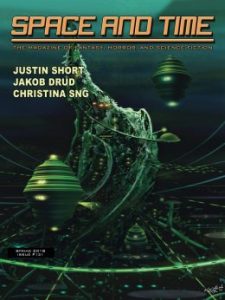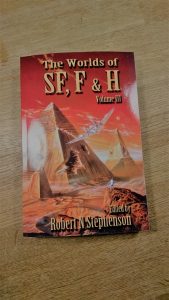My short story ‘Sandsynlighedskrydstogt’ (Probability Cruise in English) will be out in the annual Danish SF Anthology ‘Lige under overfladen 14’ this autumn. The editor even picked the story’s title to name the anthology, so I’m extra thrilled to see this story in print.
All Posts in “Ikke kategoriseret”
“Room Special”
I’m very happy to share the news that I’ll have a story in the anthology ‘Five Minutes at Hotel Stormcove’. The story is called Room Special, and I wrote it with this anthology in mind. Or to be precise, I couldn’t help writing it. The premise made several ideas pop into my mind, and I ended up writing a romantic caper.
The Hotel is a very special place with a history that stretches into the past and far into the future, so there are going to be a wide variety of stories. I know a lot of the other authors from an online writing group, so it’s safe to say I’m really excited to read this one.
‘Five Minutes at Hotel Stormcove’ will be out in May 2019. You can preorder here.
New Book Sent to Publisher
A book comes to town, a book leaves town, a book is sent off to a publisher.
I’m super excited about finishing this project, because it’s a book my daughter wanted me to write — something she could read in our own language. She got to read the first draft (and shoot holes in it) over a year ago. I patched up those holes, let the story rest while another bunch of kids and grown-ups read it, and patched some more holes before doing language sweeps. Deleted about 200 instances of ‘just’ and soooo much other sloppy language. And now it’s done, ready for the world, or as ready as I can make it.
The Danish market works a bit differently than the American or English. We don’t need agents — although some of the bigger names have them — so I’ve done what new writers do around here and sent a finished manuscript directly to a publisher.
The market is also smaller, with fewer books being published and fewer established publishing houses (about 10 reputable ones and a tangled undergrowth of semi-self-pubs). The waiting game is the same, though. Two months to an answer from this particular publisher, and no simsubs allowed. The competition is fierce, of course, with every corner of the market saturated with books and established authors. But at least I have a good book to send out.
So I’ll be waiting, fretting, and probably writing a couple of English short stories in the meantime now that the big project is out testing its wings.
Work in Progress
I’m currently working on two novels, and I thought I’d share a bit about them here.
The first is a collaboration with another writer, and that’s progressing steadily – we meet once or twice a week to plot and draft, and we aim to have draft one ready by New Year’s Eve. It’s becoming increasingly clear that this isn’t going to happen, but we haven’t set a new goal yet, so New Year’s Eve it is 🙂
This one is urban fantasy/detective type novel, featuring a new species of humans. The novel’s set in Denmark and Bialowieza in Poland, so we’re both on our home turf and out to sea writing this, since none of us have been to Poland. Fortunately we’ve had good help from one of my collaborator’s friends, who comes from Warsaw.
The second novel is an old monster with which I’ve been in an abusive relationship since 2009. It’s been locked down on a hard drive, it’s been revised, it’s been read by my writing group, it’s been shelved, and it’s been rewritten again and again.
Recently I figured out what to do with it, though. The main character never really had a voice of his own before, but lately I’ve been able to hear him speak in my head, and that has made his story much easier to write. So round about now, the book is becoming readable, page by page, and I even think it’s exciting to write it again.
I have two additional novel projects lying around, but I’m not working on them at the moment.
One of them is a YA novel in Danish, for which I just got a favorable batch of notes from beta readers. I’m still waiting for two sets of comments, but sometime this year I’m going to do a relatively quick revision and send it to a Danish publisher. An average publisher in Denmark receives about 800 manuscripts a year, and some of them publish only a handful or two. I’ll brave the odds and post about progress when there’s more news.
The fourth novel is thoroughly on standby for now, but it’s a new and dear friend whom I’m looking forward to spending more time with. I’ve only met this story twice, during NaNoWriMo in 2015 and 2017, but we’re getting along really well. And once I’m done with the other three projects, I’m going to finish the tale of how three very different people deal with being enslaved by a race of aliens who are also saving us from annihilation.
Space and Time Magazine
 The latest issue of Space&Time Magazine (#131) is out now. It contains my story ‘Reconstruction’, about old artists and dubious benefactors in a near-future broken cityscape.
The latest issue of Space&Time Magazine (#131) is out now. It contains my story ‘Reconstruction’, about old artists and dubious benefactors in a near-future broken cityscape.
Read Two Old Stories For Free
I’m happy to say that I’ve joined Curious Fictions, an online site that lets authors reprint their SF, F & H stories. So far I’ve added two stories to their library:
- Master of Business Apocalypse, which was originally published in the Unidentified Funny Objects 3 anthology.
- A Multiverse Love Story, which was first published in AE Scifi, a Canadian web magazine that is down for the moment (but may be coming back later this year).
All stories on Curious Fictions are free to read, but you can support the authors with micro donations by liking the stories.
Lubarbri out in Worlds of SF, F & H III
 Once again I have the pleasure of having a story in an anthology from the series Worlds of Science Fiction, Fantasy & Horror, edited by Robert N Stephenson. The series distinguishes itself by collecting stories from writers in many different countries, many of them exciting new names in the speculative genres.
Once again I have the pleasure of having a story in an anthology from the series Worlds of Science Fiction, Fantasy & Horror, edited by Robert N Stephenson. The series distinguishes itself by collecting stories from writers in many different countries, many of them exciting new names in the speculative genres.
This story, Lubarbri, is a near-future story about the emotions you can only experience if your brain has been expanded and modified.
You can by the book as a paperback at Amazon:
You can also download it for free/pay what you want in most ebook formats on Smashwords:
NaNoWriMo Experiences
You learn new things when you leave your comfort zone, and that’s just what I did while participating in this year’s National Novel Writing Month. I thought I’d share my experiences in case anyone wanted inspiration for increasing their productivity.
But what is National Novel Writing Month (orNaNoWriMo for short), and how does it put you under pressure? Well, it’s a challenge that takes place every November, and the goal is simple yet not easily attained: Write 50,000 words of fiction in 30 days.
Officially, those words are supposed to become a novel, but nobody is looking over your shoulder. You do it for the challenge, and if you end up writing an epic poem instead of a novel, you still win. Even if you only write 10,000 or 25,000 words, it’s progress on your writing project. You won’t get a winner’s certificate, but that’s not the point. The point is to write more and push your limits.
50,000 words amounts to 1,667 words every day, or if you’re like me and don’t write on weekends, it’s 2,272 words per weekday. For some, that may be a piece of cake, but for me it means I have to push myself beyond my usual writing pace.
So what did I learn?
1 – Forcing Productivity Increases Creativity
You have to know where your story is going to write it, right?
Except, during NaNoWriMo you may running short of material and good ideas during the process. Perhaps you wrote down all the good ideas, or perhaps the plot took an unexpected turn, leaving you with an outline that no longer makes sense.
On those days, I nevertheless sat down and reread what I had written yesterday, and started typing new words. And sometimes, the most outrageous ideas would arise after I had typed for a while. I would suddenly know how to solve a problem that I’d struggled with by deviating from the plan, and this would take the story in directions I hadn’t even wondered about before.
These sparks were usually connected to new insights about the characters and the worldbuilding rather than plot, but that didn’t matter. When I found new depths in the characters, they’d also face their situation in a new way, and that led to unexpected plot twists.
Sometimes nothing new came from all that typing. However, the great thing about NaNoWriMo is that every word counts, and if you end up writing something that’s not a good fit for the story, you can always start that scene over, or make up a new one. Getting the ‘wrong’ scene out of the system paves the way for the ‘right’ scenes.
So you can’t write bad words during NaNoWriMo. You can only write words. That takes away the frustration that usually hits me if I’ve worked an entire day on a scene that I suspect I’ll have to throw out later.
2 – Listen to Your Mind
A few days into NaNoWriMo I found that I could stop typing, but I couldn’t put my mind on hold. The creative energies were boiling even when I wasn’t writing. Brilliant!
I’m used to having ideas pop up and demand to be written. Grasping those idea when they surface is actually a skill I’ve tried to hone over the years, because the better ideas often rise up from the subconscious — all have to do is listen to them. During NaNoWriMo, I learned to listen just a little harder, and I think I became a little better at catching those subconscious curveballs. This is extremely useful for a writer, and I can still feel the benefit from this even though NaNoWriMo is over.
There’s a trade-off to being this deeply immersed in a project though. I’m much less sociable when I’m in my own headspace. During November I could feel my mind wandering when I was with other people, and for me that’s not a healthy habit, so I’m also glad it’s only NaNoWriMo once a year.
3 – Work Smarter Not Harder
I’m usually somewhat impatient with my work. When I write something, I want to finish it, get it out of the way and work on the next project. Finish a scene, finish a short story, finish a novel, just finish it. But I already knew that I wouldn’t finish the novel in November (it’ll be about 110-120K words in all), so I might as well adjust my expectations and try out a new way of working.
For me, working differently this November meant switching between projects several times per day.
Early in November I decided to alternate between two novels. The result was that I wrote about 10,000 words on a co-written project and 40,000 words on a solo project.
I also switched between scenes. My solo project has three point of view characters, so I could always switch to a different way of seeing the world if I got stuck.
In effect I threw away my impatience–never mind finishing a scene today, I could always do that tomorrow. Both types of switcheroo worked like a charm. Getting into a different mindset proved refreshing, and often resulted in a new burst of words. I’d do this perhaps four times per day, ending up with chunks of 400-700 words every time, and sometimes more.
It’s a practice I’ve chosen to continue in December, and it works like a charm. Maybe it’s because I had a ton of minor projects waiting for me after November, but it still feels more efficient.
4 – Timing is everything
Around mid-November I had fallen a little behind, and so my daily word count had to go up if I were to make it. And if 2,272 words per day look intimidating, try looking at 2,600.
For this I turned to the Pomodoro technique of writing 25 minutes at a time, followed by a break. This had the nice effect of breaking the work into manageable chunks, because anyone can write for 25 minutes, right? It turned out I could, at least, and those sessions typically yielded 4-500 words. Suddenly all I had to do was write 5-6 times a day. While this was still high-intensity work, it nevertheless became much easier.
Incidentally, once I started timing those sessions, I discovered that my attention would start to wander after 22-23 minutes of writing, so taking a break turned out to be a good idea.
In conclusion, I can say that I’ll be using what I’ve learned in the year to come – and that I hope to be under considerably less pressure.
And also, if you have any productivity tricks up your sleeve, I’d love to hear about them in the comments.
The Beginner’s Anxiety-Free Guide to Submitting Short Stories

If you’ve just started writing short stories, you may be considering sending them to magazines or anthologies. But how do you do that (easy)? How do you avoid anxiety when you submit the stories (hard)? And how do you deal with the crush of rejection that’s an inevitable part of selling short stories (sadly necessary)?
How to do it
First, finish the story. Believe it or not, this is much harder than sending it–but that’s a topic for another time.
Next, find a magazine or anthology that fits your story. You can take a look at Ralan.com or The Submission Grinder to find a long list of magazines that takes submissions from writers.
On the magazine’s website, you’ll want to find the page that says ‘Submissions’ or ‘Submission guidelines’. Submission guidelines are where the editors tell you: A) What kind of stories they’re looking for. B) How they want you to ‘package’ that story, that is, how the manuscript you send them should look. C) How you should send it in (typically by mail or through a web form).
Formatting a manuscript may take some time, especially if the magazine asks for something other than a ‘standard manuscript format’. My advice is that you always follow the guidelines, even when they’re a hassle, because a well-formatted manuscript shows the editor you’re serious about your submission. Besides, formatting a story is much easier than writing it, so just get it over with.
Don’t worry – Just send it
A frequent reason why manuscripts stay in the author’s drawer is anxiety. You may fret over the question whether the story is original enough to send, or gobsmacking goooood enough, or brilliant enough–or if it’s even remotely publishable.

Worrying about originality is perfectly natural, especially if you’re constantly trying to improve your writing. Striving to write better stories is what serious writers do, so by all means continue to think about how to blow your readers’ minds. But forget those worries while you’re in the process of submitting the story, all right? Doubts have a nasty way of turning into blocks, and you need to get your story out there.
So take a deep breath and tell yourself you’ve done all you can for your story. It’s time to send it out and introduce it to the world. You can’t control how it’ll be received, but if the story just sits on your hard drive, it won’t be received at all.
Hit the ‘send’ button, and you’re done.
A while later, just as you suspected, the editor mails you back and tells you they’re buying the story. Congratulations! Read the contract, sign and return it if you agree with the terms, and bask in the accolades from your fellow writers when your story is published.
If your story gets rejected

Of course, sometimes stories get rejected. Well, actually, this happens more often than not, and for a new writer it may be cause for concern and even anxiety. When you’ve spent hours writing a story, and years honing your craft, it can be tough to learn that an editor doesn’t want to use it. If you’re just starting out as a writer and haven’t sold a story yet, you may even wonder if you have any talent at all, if your story sucks or if you should just call it quits.
This still happens to me, and I’ve sold 30 stories and received 900 rejections. But don’t listen to those doubts.
My cure for the submission blues is to send the stories out again. But what if you’ve been hit by those anxieties mentioned above and don’t dare send anything out again, ever?
Here are a few good things to remember:
1) The competition is fierce. Magazines receive tons of stories every month. At one point, Apex Magazine reported receiving over 1200 stories in a month, although they also stated that they usually only get between 800 and 1200 stories. Since they have space for less than ten stories per issue, it means they reject a lot of perfectly good stories, and sadly, yours may be among them. This doesn’t mean anything’s wrong with your story, so go ahead and send it to the next magazine.
2) Editors know what they want. They have a vision for the kind of stories they publish in their magazine, and they may also collect stories to match a particular theme for an issue. Your story could be the best story in the universe, and it might still not be right for that particular magazine or issue. But it might be right for another magazine, so if the story is rejected, just send it out again.
3) Rejection doesn’t mean you’re banned from submitting again. In fact, editors only blacklist writers who send them an email telling them how much they hate the magazine. But a story that doesn’t fit the magazine will not get you banned, even if it’s a bit amateurish (trust me, I’d be banned for life for my first stories). Editors love to find new writers, and even if they reject your first 22 stories, they may still accept number 23 if they want it. I’m talking from experience here.
4) Trust in yourself as a writer. Your stories may not be right for a particular magazine, but if they are right for you, you should definitely write them. At a glance, this may not sound terribly productive. After all, why write stories that no one wants to read? But this may only be true for one of your stories. You next one is going to be different, and if you keep telling stories that only you can tell, you’ll have something rare that editors are going to print.
Hopefully this will help you to find the courage to submit your story again. And to write new ones.
And if you have other anxieties, feel free to mention them in the comments. If I have any advice, I’ll be sure to share it.
Choosing what to Write (Instead of Writing)
Since January I’ve been working almost exclusively on a YA project in Danish, which is a bit removed from the US writing world. My daughter wanted a story, and I had one in the back of my head that seemed just right for the occasion.
That novel is now finished, and my daughter got to be first reader (of course). She liked it, thought the ending was really exciting, and was well entertained throughout, so I’m counting that as a huge success. And even better, she wasn’t too shy to point out my typos. I’ll make a grammar nerd of her yet 🙂
So what’s next? Finishing the YA novel and getting it off to a publisher has first priority, but while it makes the rounds to three or four other readers, I have to choose between a lot of other writing projects. So I’m weaving back and forth between committing to one of the following projects:
• Finish this round of revisions on a Space Opera Monster — which means rewriting a number of scenes from scratch because the existing scenes don’t make sense after the first half of the story was revised. They’re also out of synch because the revision so far has developed some actual personality in the characters, so their current actions and choices no longer make sense… I’ve been working on this story for a long, long time. I ought to just get it over and done with, but it’s also quite painful to go through it again and again. But the thing is, there’s a collective of characters that I really like, and a story about genocide and space colonialism gone wrong that’s exciting to tell.
• It would also be a lot of fun to devote myself full time to that new collaborative project with my writing buddy Mette. At WorldCon she and Arly Sorg talked about undead who lose their memories, and we have developed the perfect setting for a supernatural mystery that will bring this idea to life. And there’s shiny worldbuilding to develop and characters to flesh out, and a mystery to concoct, and it’s all new and glorious, so woohoo? Right. Except we’ve started the actual writing, and it’s not exactly looking like the notes in our heads, so at the moment I’m accusing my imagination of overselling the project. But I’m writing for an audience (of one, so far) and that feels… surprisingly glorious! And shared burdens are half burdens, so I wonder if this isn’t what I’ll be doing for the foreseeable future.
• Well, of course I also have a new short story and a novelette I should be finishing. They’re both more than halfway done, so they shouldn’t take too long to write. Right? Right! Because it’s not like I write short stories at half the speed I write novels, is it? And it doesn’t help that one of them is a story where chronology has ceased to matter… which makes it somewhat difficult to keep track of… but also fun to write… but difficult… but at least easier to finish than a novel, right?
• Did I mention that I spent two consecutive nanowrimos cooking up 80.000 words of another space opera novel? I looked it over recently, and it’s actually pretty good. In shambles, of course, and about 30.000 words from completion, but hey, I really should finish this. November’s coming up, so maybe this is where I’m going.
And meanwhile, back in the batcave, my mind is producing new ideas every week, every one of them more glorious and alluring than the next, and I really have no other way to deal with them than put them on a list of ideas.
I’ll figure it out, but I can’t help wonder if I’m the only writer with this problem.